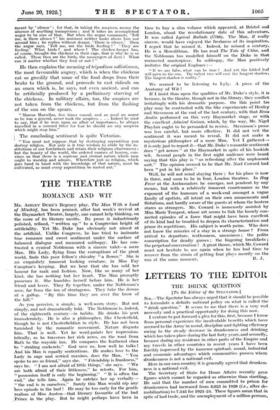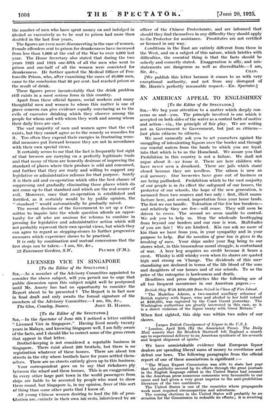LETTERS TO THE EDITOR
THE DRINK QUESTION
[To the Editor of the SPECTATOR.]
SIR,-TIIC Spectator has always urged that it should be possible to formulate a definite national policy on what is called the " drink question." It seems to me that there is a very real necessity and a practical opportunity for doing this now.
I venture to put forward a plea for this, first, because I know from personal experience the incalculable benefits which have accrued to the Army in moral, discipline and fighting efficiency owing to the steady decrease in drunkenness and drinking which has taken place during the last forty years, and secondly, because during my residence in other parts of the Empire and my travels in other countries in recent years I have been forcibly impressed by the immense spiritual, moral, industrial and economic advantages which communities possess where drunkenness is not a national evil.
Here in our own country it is generally agreed that drunken. ness is a national evil.
The Secretary of State for Home Affairs recently gave figures which cannot be regarded as otherwise than startling. He said that the number of men committed to prison for drunkenness had increased from 8,025 in 1920 (i.e., after de- mobilization) to 7,843 for 1923-24. These figures mean that in spite of bad trade, and the unemployment of a million persons,
the number of men who have spent money on and indulged in alcohol so 'excessively as to be sent to prison had more than doubled in the last four years.
The figures are even more disconcerting in the case of women. Female offenders sent to prison for drunkenness have increased from less than 1,000 at the end of the War to over 4,000 last year. The Home Secretary also stated that during the two years 1923 and 1924 one-fifth of all the men who went to prison and one-half of all the women were convicted for drunkenness. He further quoted the Medical Officer of Pen- tonville Prison, who, after examining the cases of 40,000 men, came to the conclusion that 60 per cent. had reached prison as the result of drink.
These figures prove incontestably that the drink problem still exists in a most serious form in this country.
Apart from these official figures, social workers and many thoughtful men and women to whom this matter is one of grave concern can give evidence equally convincing as to the evils of excessive drinking which they observe among the people for whom and with whom they work and among whom their daily lives are cast.
The vast majority of men and women agree that the evil exists, but they cannot agree as to the remedy or remedies for it. Too often they expend their energies in frustrating reme- dial measures put forward because they are not in accordance with their own special views.
It certainly seems to me that the fact is frequently lost sight of that brewers are carrying on a perfectly legitimate trade and that many of them are honestly desirous of improving the standard of places where their produce is sold and consumed, and further that they are ready and willing to support any legislative or administrative reforms for that purpose. Surely it is their aid and co-operation which offer the best chance of suppressing and gradually eliminating those places which do not come up to that standard and which are the real source of evil. Moreover, once that co-operation is established and fortified, as it certainly would be by public opinion, the " standard " would automatically be gradually raised.
The recent decision of the Government to set up a Com- mittee to inquire into the whole question affords an oppor- tunity for all who are anxious for reforms to combine in pressing for legislative and administrative action which will not probably represent their own special views, but which they can agree to regard as stepping-stones to further progressive measures which experience shows to be practical.
It is only by combination and mutual concessions that the first steps can be taken.—I am, Sir, &c.,
22 Ennismore Gardens, S.W. PLITMER











































 Previous page
Previous page